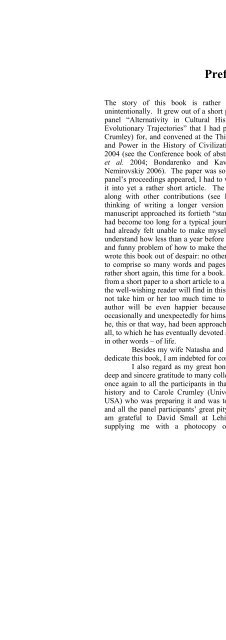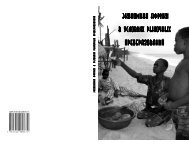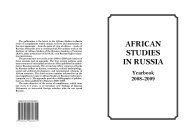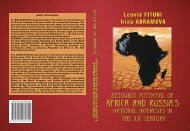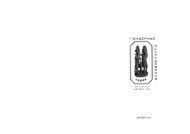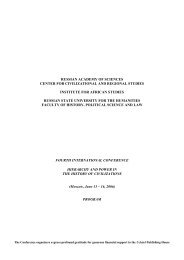Bondarenko Dmitri M. Homoarchy
Bondarenko Dmitri M. Homoarchy
Bondarenko Dmitri M. Homoarchy
You also want an ePaper? Increase the reach of your titles
YUMPU automatically turns print PDFs into web optimized ePapers that Google loves.
Preface<br />
5<br />
The story of this book is rather curious. It was written absolutely<br />
unintentionally. It grew out of a short paper prepared for, and presented at the<br />
panel “Alternativity in Cultural History: Heterarchy and <strong>Homoarchy</strong> as<br />
Evolutionary Trajectories” that I had proposed (together with Prof. Carole L.<br />
Crumley) for, and convened at the Third International Conference “Hierarchy<br />
and Power in the History of Civilizations” held in Moscow, Russia in June<br />
2004 (see the Conference book of abstracts, reports and proceedings: Alexeev<br />
et al. 2004; <strong>Bondarenko</strong> and Kavykin 2004; 2005; <strong>Bondarenko</strong> and<br />
Nemirovskiy 2006). The paper was so short that when the idea to publish the<br />
panel’s proceedings appeared, I had to write some more pages for transforming<br />
it into yet a rather short article. The article was submitted to the publisher<br />
along with other contributions (see <strong>Bondarenko</strong> 2006) but I was already<br />
thinking of writing a longer version for an academic journal. When the<br />
manuscript approached its fortieth “standard page”, I finally understood that it<br />
had become too long for a typical journal article. However, by that moment I<br />
had already felt unable to make myself stop writing, just as now I could not<br />
understand how less than a year before I was cudgeling my brains over the odd<br />
and funny problem of how to make the text at least a dozen pages long. So, I<br />
wrote this book out of despair: no other format of academic publication is able<br />
to comprise so many words and pages. Nevertheless, the text has turned out<br />
rather short again, this time for a book. So, the manuscript has passed the way<br />
from a short paper to a short article to a short book. Yet my modest hope is that<br />
the well-wishing reader will find in this opus some merits other than that it will<br />
not take him or her too much time to read it. If this turns out the case, the<br />
author will be even happier because though the book was really written<br />
occasionally and unexpectedly for himself, it deals with the problematics which<br />
he, this or that way, had been approaching and studying for not a short time at<br />
all, to which he has eventually devoted almost twenty years of academic career,<br />
in other words – of life.<br />
Besides my wife Natasha and daughter Tanechka to whom I cordially<br />
dedicate this book, I am indebted for constant support to my mother Lidia.<br />
I also regard as my great honor and privilege this chance to express<br />
deep and sincere gratitude to many colleagues. I would like to say “thank you”<br />
once again to all the participants in that very panel on alternativity in cultural<br />
history and to Carole Crumley (University of North Carolina, Chapel Hill,<br />
USA) who was preparing it and was to convene together with me but, to my<br />
and all the panel participants’ great pity, could not come to the Conference. I<br />
am grateful to David Small at Lehigh University (Bethlehem, USA) for<br />
supplying me with a photocopy of the inspiring and groundbreaking


